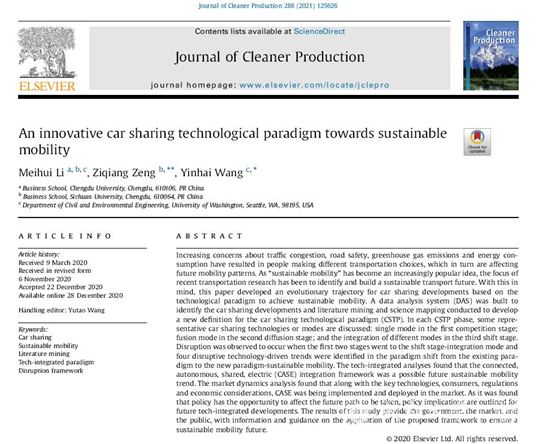Recently, Dr. Li Meihui, a distinguished associate researcher at the Business School, Chengdu University, published two research results in top journals of environmental sciences as the first author, with Chengdu University as the first unit. The paper entitled "Evolution patterns of bioenergy with carbon capture and storage (BECCS) from a science mapping perspective" was published in Science of The Total Environment (JCR and Q1 journal of Chinese Academy of Sciences, impact factor 6.551); the paper entitled "An innovative car sharing technological paradigm towards sustainable mobility" was published in Journal of Cleaner Production (JCR and Q1 journal of Chinese Academy of Sciences, impact factor 7.246).

In terms of the first paper, the study explores the evolution patterns of negative emission technologies (NETs)-bio-energy with carbon capture and storage (BECCS) from a scientific mapping perspective and visual analyses. A conceptual evolution of BECCS is conducted by SciMAT under a longitudinal framework to show the structure and dynamic aspects of the relevant scientific research. The co-word network and thematic evolution analysis reveal five main thematic areas of BECCS. It concludes that further research should continue to focus on techno-economic analyses and the ecological and environmental impacts of BECCS, and increased research on emerging biochar and hydrogen production themes is expected. The study provides a new idea for mitigating climate change.

In terms of the second paper, the study developed a technological paradigm to achieve sustainable mobility based on the development of shared cars. A data analysis system (DAS) was built to identify the car sharing developments and literature mining and science mapping conducted to develop a new definition for the car sharing technological paradigm (CSTP). In each CSTP phase, some representative car sharing technologies or modes are discussed. The integration of different modes happened in the third stage, and four disruptive technology-driven trends were identified in the paradigm shift from the existing paradigm to the new paradigm-sustainable mobility. The tech-integrated analyses found that the connected, autonomous, shared, electric (CASE) integration framework was a possible future sustainable mobility trend. The results of this study provide the government, the market, and the public, with information and guidance on the application of the proposed framework to ensure a sustainable mobility future.
News link:
Li Meihui, graduating from the joint Ph.D. program of Sichuan University and the University of Washington, was employed by the Business School, Chengdu University in 2019. Her main research interests lie in technical economy and management, low-carbon energy technology paradigm, science mapping, and bibliometrics. She has published 15 papers in authoritative Chinese and foreign journals such as Energy Conversion and Management and Science of The Total Environment, including 9 in SCI/SSCI journals. She won the first prize of the 18th Social Science Outstanding Achievement Award in Sichuan Province.